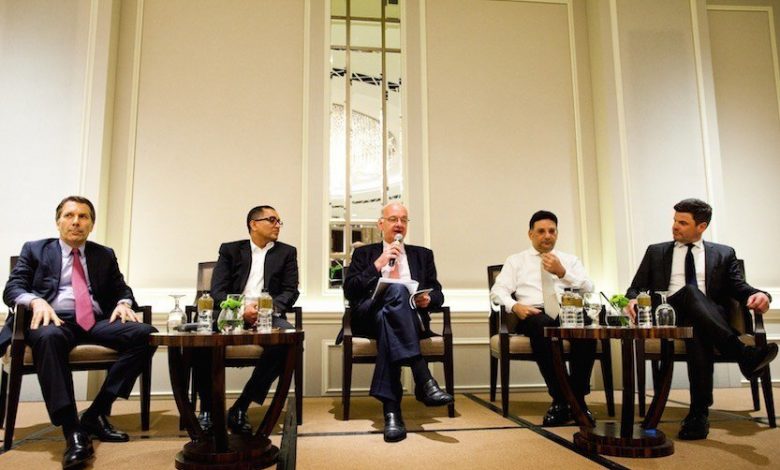Maritime CEO Forum: Sniff of an uptick in dry bulk draws operators back into the arena

A sniff of a return of a decent dry bulk market will likely see many operators return to the sector endangering any chance of a protracted upturn, delegates attending last week’s Maritime CEO Forum were told.
The event, held at Singapore’s iconic Fullerton Hotel, gathered a stellar line up of panelists and attendees.
Moderating the dry bulk session was Tim Huxley, CEO of Hong Kong’s Mandarin Shipping, who kicked off proceedings by saying: “The general consensus is the worst has passed as best evidenced by the busy S&P activity seen in the first quarter this year.”
Michael Nagler, head of chartering at the Noble Group, said he was “modestly positive” about dry bulk prospects but he warned that with volatility returning there is a strong possibility more operators will flock back to the market, something Nagler said was not good for future prospects.
Govind Ramanathan, managing director at the Robert Kuok-controlled PCL Shipping, was not bullish.
At best, Ramanathan said the sector was at the start of a recovery, but there was still a long way to go. He urged for more scrapping and said 2017 would remain “challenging”.
Lasse Kristoffersen, president and CEO, Torvald Klaveness, agreed that more ships need to be recycled.
“We have a supply problem,” he said, adding: “We are destroying this industry by ourselves. The demand side will be there, but yards I am sure will be able to deliver in 2018.”
Pankaj Khanna, CEO at Singapore’s Pioneer Marine was the most optimistic of those on the stage, describing himself as “quite bullish”. He cited stats out of China this year showing how steel consumption was up 4%, iron ore imports are up 12% and coal 30%. “This is a demand-led recovery,” he maintained. Khanna also noted how the dry bulk orderbook now stood at less than 10% of the extant fleet for the first time since 2002, and he felt, unlike Kristoffersen, that shipyards will not be able to deliver much before the start of 2019. Khanna sees this current bulk uptick lasting 18 to 24 months.
The uptick will see more investments pile in, Kristoffersen reckoned, principally from Asia and led by China. True, agreed, Khanna who said it was just too easy and cheap to get set up in dry bulk these days.
PCL’s Ramanathan questioned this belief however, telling delegates: “I don’t see these fly-by-night operators having much of a future going forward – counter party risk is too important now.”
Attention then turned to the likelihood of a bunch of new orders flooding the market, given how cheap newbuilds are these days with capes at just $40m and brand new kamsarmaxes being offered for just $24m.
Kristoffersen revealed how he’d just been in Greece and met 20 owners, half of whom told him they were looking at ordering replacement tonnage.
“I am afraid there is lot more action going on at shipyard boardrooms in China than we know,” he warned.
Noble’s Nagler responded, saying: “Everyone can still feel the wounds from the past and that should slow down ordering.”
Ramanathan from PCL hoped Nagler was correct. “It is definitely a worry if newbuilding orders come in a big way,” he said, adding: “Everyone needs to be responsible and a little restrained.”
Nagler said the very nature of dry bulk shipping and its boom-bust cycles made it impossible to get the whole industry aligned.
Concluding, Kristoffersen maintained: “If you want a sustainable return in dry bulk you have to focus on just three to six months ahead.”
The Maritime CEO Forum was sponsored by Cobham, Dualog, DVB Bank, Gray Page, Q88, ShipServ, Transas, Veritas Petroleum Services, V.Group and Wartsila. The next forum takes place during Hong Kong Maritime Industry Week at the Foreign Correspondents’ Club in the heart of Central in Hong Kong on the afternoon of November 22.

Lasse Kristoffersen is almost certainly right about what may be going in the board rooms of Chinese shipyards. There are plenty of rather hungry shipyards in China and we must never forget that shipyards, unlike shipowners, are politically significant corporations – they, and their associated clusters, employ a lot of people in one place. Heaven is still high and the Emperor is still at quite a distance.
looks that the main players of seaborne trading are no aligned in their perspective returning of lavish dry bulk market for the years to come. In fact the UNCTAD is estimating a global economic growing rate at 2.5 pct by the year 2017. As a result, more pressure against maritime industry and freight level slowing down with majors demand by shipowners, rather than cargo offer by land industry/manufacturers.
Paulo Silvano